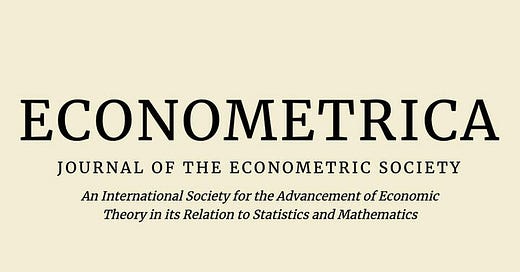Reader's Digest of Econometrica Papers
How Claude AI can make Econometrica papers far more readable for applied economists
Ben Golub had the idea of summarizing technical papers (such as in Econometrica) using AI to be more easily approached by non-technical economists. These papers were selected from the list of the most prominent recent papers in Econometrica by Google Scholar.
I posted the two examples on my blog. I link them here, and give you a flavor of the high-level takeaways that I think are quite nice. Claude is very good at this. Seem quite plausible that this could be used at different levels of technicality.
Deep Neural Networks for Estimation and Inference
Farrell, Liang, and Misra (Econometrica, 2021)Key Takeaway: This paper proves that deep learning can be safely used as a first step in modern econometric analysis. If you’re using machine learning for things like propensity score matching or predicting treatment effects, you can now confidently use deep neural networks and still get valid statistical inference in your second stage analysis. This fills a crucial gap, as while deep learning has shown impressive empirical performance, economists have been hesitant to adopt it without theoretical guarantees.
Targeting Interventions in Networks
Galeotti, Golub, and Goyal (Econometrica, 2020)
The One Big IdeaWhen trying to influence behavior in a networked system (like encouraging technology adoption among farmers or increasing educational effort in schools), the optimal intervention strategy depends crucially on whether actions are strategic complements (people want to match what their neighbors do) or strategic substitutes (people want to do the opposite of their neighbors). With complementary actions, focus resources on well-connected “central” individuals. With substitute actions, target pairs of individuals who aren’t directly connected. This seemingly complex problem can be solved systematically using network “principal components.”



This is a life-saver, THANK YOU
As someone who has varying expertise across fields, I wonder if a good addition would be possible criticisms from a skeptical reader. When I'm reading journal articles, I often wish I could know possible criticisms an expert would have. What robustness checks are they missing? What are confounders based on the previous literature that I might not think of? Essentially, what would the comment after its presentation at a conference look like? This might work better for working papers than Econometrica ones.